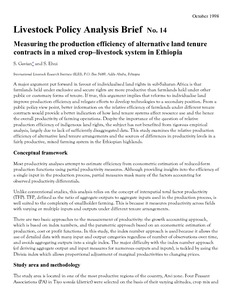Resource information
A major argument put forward in favour of individualised land rights in sub-Saharan Africa is that farmlands held under exclusive and secure rights are more productive than farmlands held under other public or customary forms of tenure. If true, this argument implies that reforms to individualise land improve production efficiency and relegate efforts to develop technologies to a secondary position. From a public policy view point, better information on the relative efficiency of farmlands under different tenure contracts would provide a better indication of how land tenure systems affect resource use and the hence the overall productivity of farming operations. Despite the importance of the question of relative production efficiency of indigenous land rights, the subject has not benefited from rigorous empirical analysis, largely due to lack of sufficiently disaggregated data. This study examines the relative production efficiency of alternative land tenure arrangements and the sources of differences in productivity levels in a fairly productive, mixed farming system in the Ethiopian highlands.



